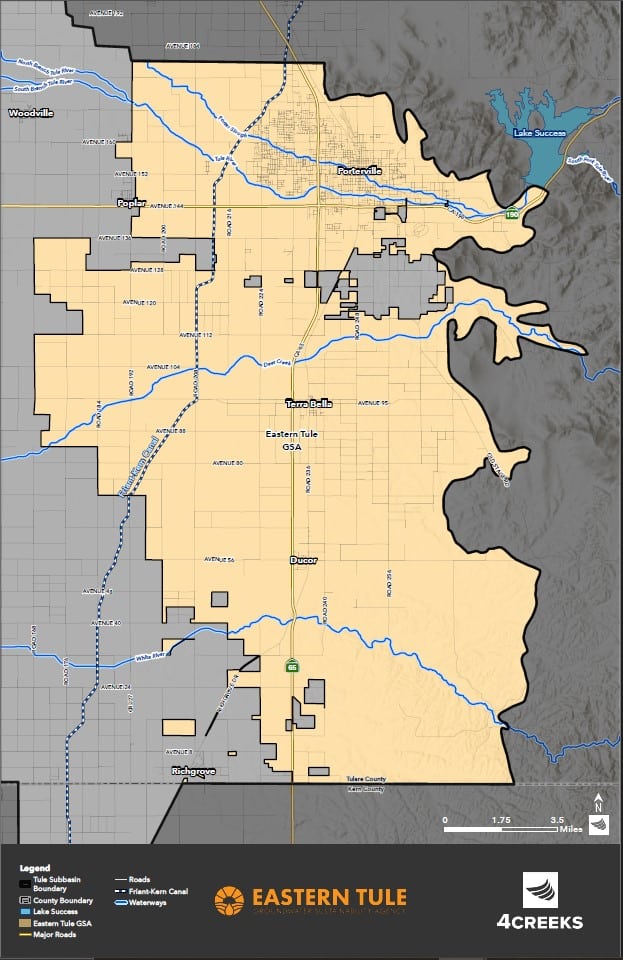By Lisa McEwen, SJV Water
 A 12th groundwater agency sprang into being Tuesday after a marathon meeting of the Porterville Irrigation District, which voted to formally break ties with the embattled Eastern Tule Groundwater Sustainability Agency.
A 12th groundwater agency sprang into being Tuesday after a marathon meeting of the Porterville Irrigation District, which voted to formally break ties with the embattled Eastern Tule Groundwater Sustainability Agency.
Though the move was meant to protect farmers from anticipated state sanctions against Eastern Tule and other GSAs in the region, farmers who crammed shoulder to shoulder in the small irrigation district meeting room had other concerns.
Specifically, they wanted more representation on the new agency, a joint effort between Porterville Irrigation District and the City of Porterville, which will have two representatives each on the new entity.
The landowners at Tuesday’s meeting wanted more farmer representation on the new board.
“We need people with skin in the game to make good decisions,” said Terry Schuler. “People from downtown will look at this differently than all the other guys in this room.”
District board president Eric Borba and General Manager Sean Geivet assured the audience that Porterville ID will remain in control of its district, explaining there will be two management areas within the new GSA, one for the city and one for Porterville Irrigation District.
The growers asked that the new GSA increase its board seats to five so the irrigation district could have three board members, but irrigation district attorney Aubrey Mauritson pointed out that would constitute a quorum of irrigation district board members, which would run afoul of Brown Act rules.
Besides, a board tipped in favor of the district wouldn’t sit well with the City of Porterville, district board members pointed out.
“We are here to represent landowners,” Board Member Brett McCowan noted. “I am supportive of a motion that at some point in the future, will have legitimate representation from landowners.”
Growers then asked for a grower stakeholder committee, as other groundwater agencies have formed, which the district agreed to.
“There is a lot of expertise in this room, and landowners would like some transparency and inclusivity in the process,” said landowner Jared Plumlee. “This is not a complaint session or a lynch mob. We just want to be included. This impacts everything we have, our livelihood, our generational wealth and land values.”
Doubling GSAs
All of this stems from the slow death of Eastern Tule GSA, which has seen nearly all of its member agencies depart to form their own GSAs.
With its vote Tuesday, Porterville is the latest. Terra Bella and Saucelito irrigation districts, also managed by Geivet, voted earlier this month to leave Eastern Tule and form their own groundwater agencies. Tea Pot Dome Irrigation District broke off to create its own agency last summer.
That brings the number of GSAs in the Tule subbasin to 12; it began with six.
The Tule subbasin was placed on probation, with some exceptions for certain GSAs, in September. Eastern Tule was not given a pass. In fact, Water Resources Control Board members called its groundwater accounting methods “alarming.”
Groundwater accounting is the subject of a lawsuit against Eastern Tule by the Friant Water Authority, which alleges the GSA gave farmers too many groundwater credits, allowing them to continue overpumping, contributing to subsidence that has damaged the Friant-Kern Canal.
The excess credits also meant Eastern Tule farmers didn’t have to pay as much for groundwater. Friant had counted on that money to help it pay a portion of the costs to fix a 10-mile section of the canal through Eastern Tule’s borders.

Who should pay?
Though Porterville Irrigation District and a handful of other districts with access to surface water had made up Eastern Tule, the groundwater agency also covers large swaths of ground outside of water districts where farmers are totally groundwater dependent.
It’s those farmers Friant had hoped Eastern Tule would collect steep pumping fees from that would then be delivered to Friant.
When that didn’t happen and the lawsuit against Eastern Tule stalled, Friant voted in August to collect that money – up to $295 million – from Porterville, Terra Bella, Saucelito and Tea Pot Dome water districts.
Tea Pot Dome is in settlement negotiations with Friant, but Geivet’s three districts are not backing down and have fired off several lawsuits against Friant.
Target on their back
The ongoing Friant brouhaha was another concern for growers at Tuesday’s meeting.
Said dairyman Matt Kidder, “We need to solve the Friant problem before moving ahead. Otherwise, the politics will play into us.”
Grower Mike George agreed.
“It’s really clear to me that we got noodled at Tule hearing,” he said. “The elephant in the room is Friant. Even though there’s no subsidence in Porterville, we are still tied in with Eastern Tule. Carrying that baggage will make us unsuccessful” in avoiding future probationary fees by gaining exemptions from the state water board like Delano-Earlimart and Kern-Tulare GSAs.
“Jason (Phillips, CEO of Friant Water Authority) has had the ear of the state water board since the ETGSA lawsuit,” Geivet said. “They put a big target on us. We are not contributing to subsidence. We are water-rich and cash poor.”
Geivet believes Porterville Irrigation District can prove its case for sustainability because the district has healthy surface water contracts. Linking up with the city is important and necessary because the two overlap boundaries.
District board president Borba described the city as “aggressive” when it comes to recharge. “They regularly buy water from us and bank it,” he said.
The city also can store water behind Schafer Dam at Lake Success above the city, and has a proven track record mitigating domestic wells, a key tenet of the Sustainable Groundwater Management Act.



